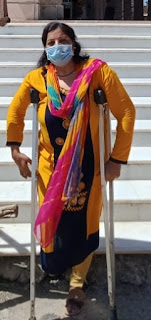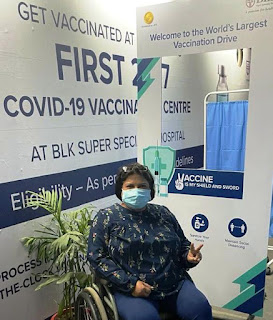Don’t Leave People with Disabilities Behind in the Covid-19 Response
Date: 25 May 2021
At present with India battling probably the most mutant version of the deadly Covid-19 virus, there have been innumerable instances that have shown how persons with disabilities (PwDs) are neglected and end up falling through the cracks. As the ongoing devastation of the pandemic continues to unfold; in such a scenario, the poor, the marginalized and the ostracized end up being the most badly affected. Amongst them, PwDs are one of the most vulnerable populations.
Introduction
Inclusion of PwDs through
the various aspects of the pandemic from the initial phase of the lockdown in
2020 to the vaccination drive to the present humanitarian crisis has been
flawed, with challenges and gaps, at every step along the way. Even though,
PwDs are at a higher risk of Covid-19 and even death, yet they are not being given
the needed priority in India’s Covid-19 response. This can be observed from the
fact that every guideline issued for PwDs has only emerged as a response to
active advocacy efforts. Moreover, there are pending cases in various courts
petitioning for prioritization in vaccination for PwDs also an advocacy
initiative by the people for the people.
About the Project
Samarthyam in partnership with UNESCAP has commenced the
project “Protecting and empowering persons with disabilities in the context of
the COVID-19 pandemic”. The overall objective of this partnership is to
strengthen the capacities of persons with disabilities, OPDs, mainstream
community networks and government agencies in India to integrate the promotion
of disability rights and disability inclusion into institutional and community structures,
processes and mechanisms, thereby contributing to an improved standard of
living for persons with disabilities. Samarthyam collaborated with APNO, the
Rajasthan state level network of PwDs (an initiative of Sightsavers India) and consolidate
the ground realities and challenges faced by PwDs.
Preeti’s Ordeal in getting
Covid-19 Vaccine
A case in example is the
lived experience of Preeti, a woman with locomotor disability, 35-year-old
resident of Chittorgarh, Rajasthan and active member of APNO. When the
vaccination for the 45+ age group began, she accompanied her father to a health
center near their house to understand the provisions for both of them regarding
the same. In the course of the conversation with the medical team present at
the center, she was informed that the current drive is being carried out for
both the senior citizens and PwDs. This came as a shock to her as in the
Organization of Persons with Disabilities (OPDs) networks no such information
was received. To her utter shock no information regarding the inclusion of PwDs
in the vaccination programme was available on the concerned government portal as
well. This gap in crucial information proved to be the biggest impediment that she
had to face in order to register herself for the vaccination.
As a first step, Preeti had to physically go from pillar to
post in order to gather the correct and relevant information from the concerned
departments, exposing herself to the possibility of catching the infection by
stepping out into public spaces and engaging with other people. She was left
with no option, as they were no dedicated helpline or toll-free numbers to
access the required information and related procedures.
Once
she succeeded in registering herself for vaccination, the fight had just begun,
as there were barriers to access vaccination centres, lack of ramps for
wheelchair users and volunteers/ way finding signages in the centres during
vaccination. Additionally, there were no special queues or priority procedures
in place for vulnerable populations like PwDs leading to long waiting times for
them, thereby increasing their vulnerability. Preeti said that, “studies have
shown that PwDs are three times more likely to get infected or die of Covid-19
than the general population. They experience a higher risk of contracting the
virus as they require staying in close contact with others for personal care
needs. And if infected, recovering is a challenge.”
When the going gets tough,
the tough get going
- Given this fact, it is most essential that PwDs are prioritized through the vaccination programme and for this Preeti strongly felt the following needs to be ensured:
- Availability
of correct and precise information regarding vaccinations at all points of information generation and dissemination
amongst the populace;
- Information
is easily available and complies with information and communication
accessibility standards;
- Physical
accessibility is met at all vaccination centres with appropriate facilities for
wheelchairs, accessible toilets and requisite assistance for PwDs including
volunteer support;
- Home-based vaccination drives for PwDs and senior citizens who cannot go to the centers; and
- Drive-in vaccination points as established in Mumbai city in India.
Way forward
Deliberating on Preeti’s and
other Members of the APNO from other districts of Rajasthan inputs, an Advisory
was drafted by Samarthyam. The Advisory is to be notified by the central
government for all state governments’ compliance The Advisory contemplates upon
factors viz. Do’s and Don’t’s for
PwDs, Caregivers and State Parties, and access to essential services by PwDs and their families. Hence,
the Advisory is sent to Department of Empowerment of Persons with Disabilities,
Ministry of Social Justice & Empowerment, Government of India for notification
and implementation by the state governments.
Lessons learnt
Active advocacy and timely
support from the central and state government can help in getting the necessary
relief in the lives of PwDs and help them to protect themselves against the Covid-19
crisis. Self advocacy and heads up by PwDs during disasters, especially during
the current pandemic will facilitate ‘leave no one behind’ and ‘Build Back
Better’ towards disability rights and disability inclusion at the district
level.
Bureau of Indian Standards, Government of India
Indian Roads Congress, Government of India
Transport Research Board, USA




Comments
Post a Comment